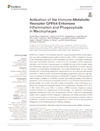Please use this identifier to cite or link to this item:
https://accedacris.ulpgc.es/jspui/handle/10553/75296
| Title: | Activation of the Immune-Metabolic Receptor GPR84 Enhances Inflammation and Phagocytosis in Macrophages | Authors: | Recio Cruz, Carlota Pilar Lucy, Daniel Purvis, Gareth S. D. Iveson, Poppy Zeboudj, Lynda Iqbal, Asif J. Lin, Daniel O’Callaghan, Chris Davison, Lucy Griesbach, Esther Russell, Angela J. Wynne, Graham M. Dib, Lea Monaco, Claudia Greaves, David R. |
UNESCO Clasification: | 3207 Patología | Keywords: | Immunometabolism Inflammation Metabolic G protein-coupled receptors GPR84 Macrophages |
Issue Date: | 2018 | Project: | NNF15CC0018346 RG/15/10/23915 RE/13/1/30181 15/0005171 WT096398MA RF 238 |
Journal: | Frontiers in Immunology | Abstract: | GPR84 is a member of the metabolic G protein-coupled receptor family, and its expression has been described predominantly in immune cells. GPR84 activation is involved in the inflammatory response, but the mechanisms by which it modulates inflammation have been incompletely described. In this study, we investigated GPR84 expression, activation, and function in macrophages to establish the role of the receptor during the inflammatory response. We observed that GPR84 expression in murine tissues is increased by endotoxemia, hyperglycemia, and hypercholesterolemia. Ex vivo studies revealed that GPR84 mRNA expression is increased by LPS and other pro-inflammatory molecules in different murine and human macrophage populations. Likewise, high glucose concentrations and the presence of oxidized LDL increased GPR84 expression in macrophages. Activation of the GPR84 receptor with a selective agonist, 6-(octylamino) pyrimidine-2,4(1H,3H)-dione (6-n-octylaminouracil, 6-OAU), enhanced the expression of phosphorylated Akt, p-ERK, and p65 nuclear translocation under inflammatory conditions and elevated the expression levels of the inflammatory mediators TNFα, IL-6, IL-12B, CCL2, CCL5, and CXCL1. In addition, GPR84 activation triggered increased bacterial adhesion and phagocytosis in macrophages. The enhanced inflammatory response mediated by 6-OAU was not observed in GPR84−/− cells nor in macrophages treated with a selective GPR84 antagonist. Collectively, our results reveal that GPR84 functions as an enhancer of inflammatory signaling in macrophages once inflammation is established. Therefore, molecules that antagonize the GPR84 receptor may be potential therapeutic tools in inflammatory and metabolic diseases. | URI: | https://accedacris.ulpgc.es/handle/10553/75296 | ISSN: | 1664-3224 | DOI: | 10.3389/fimmu.2018.01419 | Source: | Frontiers in Immunology [ISSN 1664-3224], v. 9, 01419 |
| Appears in Collections: | Artículos |
WEB OF SCIENCETM
Citations
117
checked on Feb 15, 2026
Page view(s)
40
checked on Jan 10, 2026
Download(s)
53
checked on Jan 10, 2026
Google ScholarTM
Check
Altmetric
Share
Export metadata
Items in accedaCRIS are protected by copyright, with all rights reserved, unless otherwise indicated.
